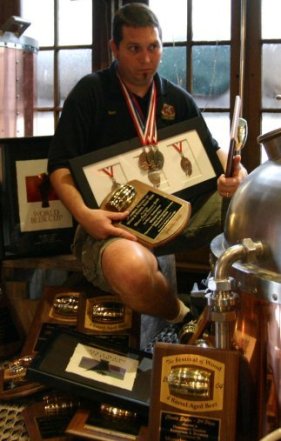 True story: A week or two ago, I’m walking down the street and I catch this aroma. My nostrils perked up. What is that? I thought. Not the scent of a beautiful woman. Not the scent of a warm Krispy Kreme doughnut. It was sweet, fruity and perplexing as I scanned the files of my brain for what it was. Aha! It was those grape-flavored cigars that Monte occasionally lights up while he brews. Why would I smell that? I must be nuts.
True story: A week or two ago, I’m walking down the street and I catch this aroma. My nostrils perked up. What is that? I thought. Not the scent of a beautiful woman. Not the scent of a warm Krispy Kreme doughnut. It was sweet, fruity and perplexing as I scanned the files of my brain for what it was. Aha! It was those grape-flavored cigars that Monte occasionally lights up while he brews. Why would I smell that? I must be nuts.
I’m all proud that I figured it out when I look to my left. What do I see across the street? It’s freakin’ Monte! I smelled that rascal from clear over here! What an ass-kicking, beer-trained sniffer I’ve got. I’m way proud of my olfactories right about now. I’m a wild animal, tuned in to my surroundings. I can smell and identify a man from 75 feet away.
We beer folk get tuned in, striving to identify those flavors, those aromas. To pick them apart and name them and appreciate their origins and the skills of the brewer that brought them together in a sometimes mindbending chorus of love.
However… Not long ago, there was a thread on The Beer Mapping Project’s forums that caught my attention. A beer lover was waxing philosophically, as many of us do, on the nuances he’d noticed. The beervolution of flavors in a beer he’d had many times:
It seems to me that when you drink something consistently, you can start to pick up on the differences and adjuncts of a beer…
But it’s something to be noticed over time. It just goes to show that even the bestest beers can sour and sometimes suck on some days and sometimes they can even shine… but only if the care behind the beer is there… or sometimes not… sometimes it’s just a happy accident….
I don’t really understand why tho… they use the same formula don’t they? It’s not like the mean to change things so radically that the beer tastes different or so off base that you can go from one beer or batch to another…
I thought, you know, this guy’s got a point. We get tuned in. We know when a beer has Cascade hops or Fuggles hops. We can tell when a beer didn’t attenuate. We can tell if perhaps the wort wasn’t aerated well enough, or if it fermented a little too warm. We can tell if a bar needs to clean its lines.
And then I thought, you know, this guy’s running the risk of Over-Analysis Syndrome. Like many of us beer enthusiasts, maybe he’s clouded by all the beers he’s loved before. Taking too seriously his ability to identify diacetyl, DMS or acetaldehyde. We all do it.
Judging by some of the responses in the thread, I wasn’t alone:
It has long been my experience that regardless of what I’m consuming — beer, wine, favorite dishes — there are perceived taste variances where there should be none: brews from the same batch, wines from the same vintage and maker, dishes I’ve repeatedly prepared. And nine times out of ten, I’m the factor that makes it taste different. Sure, once in a while, there’s a cork issue, or perhaps a bad sealing job, or maybe I wasn’t paying attention while cooking. But most of the time, it’s me — a mood change, or mild illness, or something I ate that changes the ability of my taste buds to do their thing, or memories affecting the reality.
So the care behind the bottle isn’t the factor… it’s the person drinking it, and when and how and under whatever circumstances. We notice it more because we invest more in our brews, but it’s there. I’ve been drinking pilsners and dortmunders recently, and notice at times Munich or biscuit malts are overwhelming, yet at others times, the same brews are classicly perfectly balanced. It’s not them, it’s me. And you.
and:
I’m sure some beers have changed recipes over time, bur I think much of these differences are changes in perception. We aren’t comparing two beers. We are comparing one beer against our memories of our prior drinking experience.
and:
I’ll be sitting at a brewpub drinking pints of the same beer and see changes from one pint to the next. I was discussing this with the brewer one night how the first pint showed great malt character but the next one showed lots of hops. He said the difference was all in my head. I agreed.
 And then came the response of Matt Van Wyk, Brewmaster at Flossmoor Station Restaurant and Brewery and 2006 Small Brewpub Brewer of the Year at the Great American Beer Festival (among other accolades):
And then came the response of Matt Van Wyk, Brewmaster at Flossmoor Station Restaurant and Brewery and 2006 Small Brewpub Brewer of the Year at the Great American Beer Festival (among other accolades):
Me: Andrew, do we still have 6# of Cascade downstairs?
Andrew: Nope, but we have 5# of Centennial.
Me: cool, go grab itMe: Can I get Weyerman Special B please?
Salesperson: We don’t carry that Brand.
Me: How about Caramel 120?
S’person: coolMe: Does this water have more Chlorine in it this summer?
Andrew: smells like it.
Me: call the village and then boil it a bit.
Andrew: coolMe: Andrew, wanna make the Stationmaster a little more hoppy?
Andrew: sure, you mean like Gumballhead?
ME: sounds good-I love that beer
Andrew: coolMe: Andrew, make sure all of those 10,000 new bottles get rinsed before filling
Andrew: you think one of them could have some residue in them
ME: yes, and it could affect one bottle without us knowing
Andrew: coolAndrew: do you think our batch size is too big
Me: yes, 15 bbls is too much. Slower beers taste different by the end of their run.
Andrew: Oh.Me: HEy why did this lager not take off for three days
Andrew: MAybe they didn’t send us enough yeast
Me: crapfade to black……
As many people posted, a lot of the differences do derive from the drinker him/herself. Obviously the bud/miller/coors brands out there will not vary and even the sierra/Sam Adams/etc are becoming less and less varied. But anyone smaller certainly has a LOT of variables to contend with. (maybe you can tell us what beers in particular brought you to this quandry)Some strive for consistency and others don’t. I think you can see in which camp I reside. Striving for improvement in each batch is more important to me than thinking I have a perfect beer that can be bettered.
I reckon the point I strive to make is that sometimes we need to remember what Charlie said, and relax a little more, to not worry quite so much. While we have a brew, let’s make it a point to just enjoy the thing every once in a while.
I used to work with a guy that took himself too seriously. I couldn’t stand that guy. He took himself so seriously that no else did. Not his boss. Not his peers. Not his employees. I don’t want to be that kind of beer drinker. There must be balance between my smarty-pants scrutiny and my enjoyment of a beer.
So let us take hold of Matt’s award-winning laid back attitude and keep ourselves in check. Let us not get big heads. Let us not analyze to the point of over-analysis. Let us remember to enjoy the pint before us. Let us not be too critical of the craftsmen responsible for it. Let us not expect a Bud-like widget of a beer.
That would take the craft out of craft brewing, and by my analysis, part of the fun out of the beer.
__________
Related Links:
Flossmoor Station Blog (and here’s Matt’s take on Over-analysis Syndrome)
If you liked this philosophical Syndrome crap, check out my November post on Armchair Brewer Syndrome








I suspect I know who that guy was that took himself too seriously:)
Heh, heh, heh. It wasn’t you or me. That’s for sure.
Here here! We shouldn’t strive to be robotic taste testers.
I’ve heard that Michael Jackson had a keen eye for beer, but, knew it was dangerous to let that get in the way of the experience of the place and people…and especially the story behind the beer.
[…] once wrote a post (in conjunction with Matt at Flossmoor) called Over-analysis Syndrome. It wound up causing a stir over at Rate Beer. The thread really saddened me, because both Matt and […]